The Gulf state has long stressed the importance of ensuring women and girls have access to work and education.
Qatar has expressed “its great concern and disappointment” with the interim government of Afghanistan’s decision to close Afghan girls’ schools on Wednesday hours after opening them.
The Taliban had promised what was seen as a more moderate rule when they militarily seized power on 15 August last year. Speaking to Doha News at the time, Taliban spokesman Suhail Shaheen said that girls were allowed to go to school as long as they worse the headscarf.
Seven months since the takeover, high school female students, between seventh and 12th grade, were turned away from their schools per the ministry of education’s order.
Qatar’s foreign ministry (MOFA) said “that these practices will have negative implications on human rights, developments, and the economy of Afghanistan”.
Qatar hosts face-to-face meeting between Taliban and US during Antalya Forum
“As a Muslim country where women enjoy all their rights, including the right to education, Qatar calls on the caretaker government of Afghanistan to revisit its decision in line with the teachings of Islam in relation to women rights,” said MOFA.
The Gulf state added that it remains committed to cooperating with the international community to preserve the rights of “all segments of the Afghan people”.
Since the Taliban takeover, Qatar has urged the interim Afghan government to ensure the protection of the rights of women and girls.
Speaking to the Newsweek in February, Qatar’s Foreign Minister Sheikh Mohammed bin Abdulrahman Al-Thani said that his country repeatedly pressed the Taliban to ensure women and girls achieve their rights.
“We have seen some small steps, which are not that much significant, but we keep pushing the Taliban to do more and to make sure women are allowed to go back to their workplace and practice their lives normally,” he said.
Whilst schools opened for girls in the city of Herat, girls above sixth grade in Kabul were turned away. The Afghan ministry of education said that boys can continue their education as schools for girls above sixth grade will remain closed until further notice.
“The Ministry of Education once again assures our nation that it is fully committed to providing the educational rights of all our compatriots. In order to generalise and standardise the quality of education,” said Aziz Ahmad Rayan, director of publications and communications at the Ministry of Education.
Female students who spoke to Afghan media outlet, TOLOnews, had expressed their frustration over the decision, which came at the beginning of the academic year.
“When I came to school in the early morning, I was so happy, I saw our principal was crying, I did not know the reason. After that, all the students were crying,” Uranus, a student, told TOLOnews.
During the previous Taliban rule, which lasted between the late 90’s and 2001, the group had banned girls from accessing education and women from going to work. Females were also not allowed to leave their houses without a male guardian.
Former Afghan President Hamid Karzai, who remained in the country following the takeover, called on the acting government to not contribute to the agenda of those who want a “needy” and “subordinate” Afghanistan.
Those calls were also echoed by the former Afghan government’s Chairman of the High Council for National Reconciliation Abdullah Abdullah.
Global condemnation
Globally, human rights activists and prominent figures have joined in the condemnation over the latest development in Afghanistan.
US special envoy for for Afghan women, girls, and human rights Rina Amiri said that the decision was a betrayal of Afghan families, noting that the move was not tied to Islam.
“Today’s decision to stop girls over grade 6 from returning to school was not incidental. It was made by Taliban leadership and is a betrayal of Afghan families,” said Amiri.
Campaigner for girls’ education and Nobel Peace Prize laureate Malala Yousafzai also took to social media to express her concern on the matter.
“I had one hope for today: that Afghan girls walking to school would not be sent back home. But the Taliban did not keep their promise. They will keep finding excuses to stop girls from learning – because they are afraid of educated girls and empowered women,” tweeted Yousafzai.
Special Representative for Afghanistan and Head of the United Nations Assistance Mission in Afghanistan (UNAMA) Deborah Lyons said the reports coming from Afghanistan are “disturbing.”
“Hearing disturbing reports that female students above the sixth grade will not be invited back to school by the authorities, If true, what could possibly be the reason?” tweeted Lyons.
Follow Doha News on Twitter, Instagram, Facebook and Youtube







